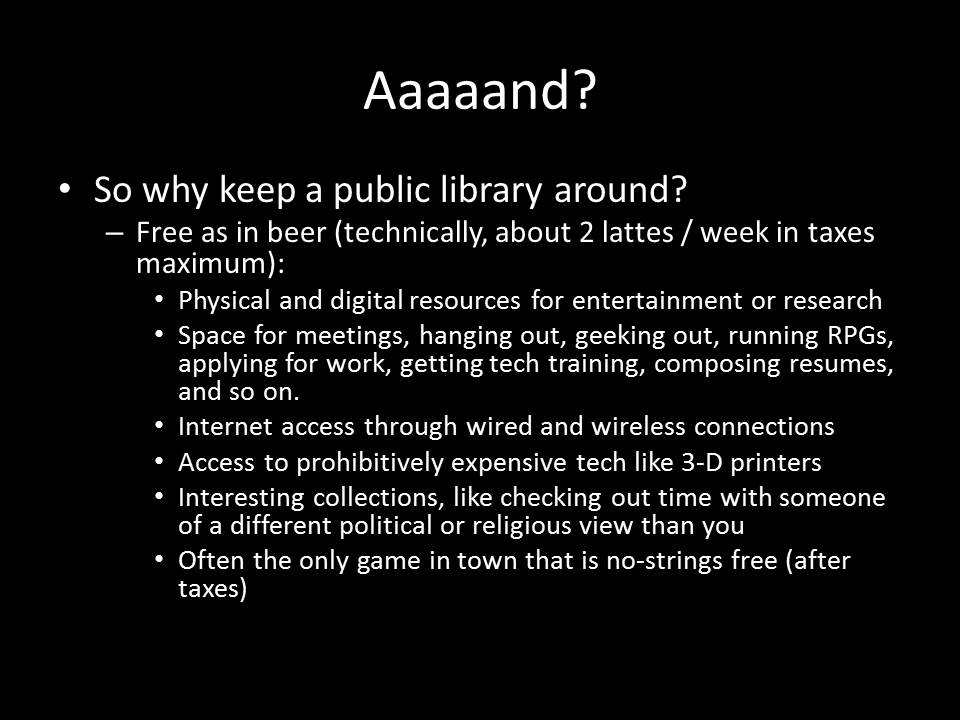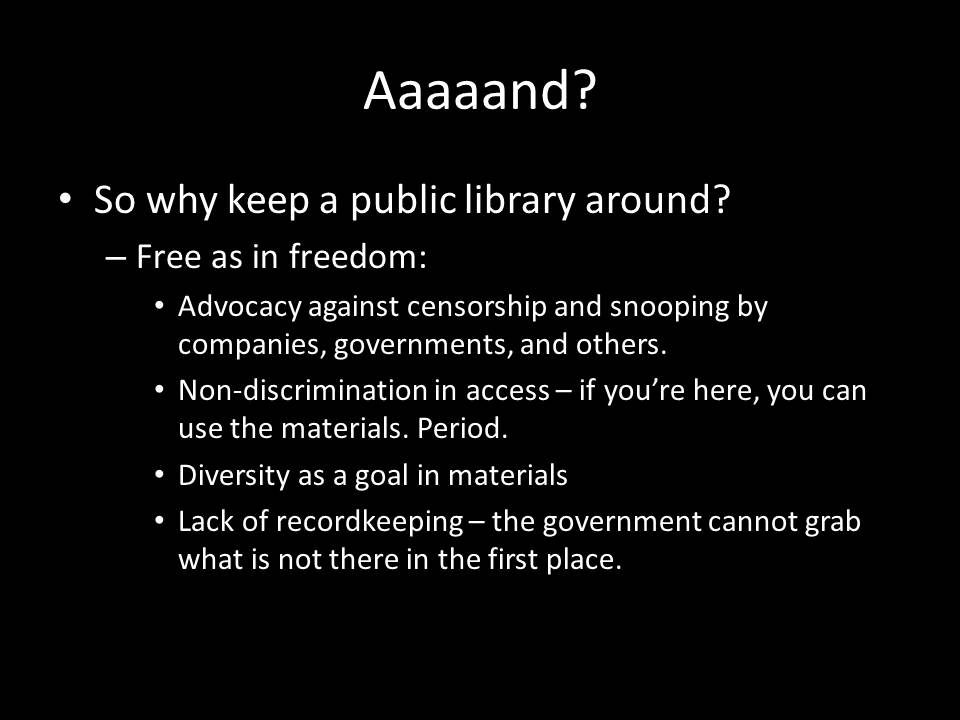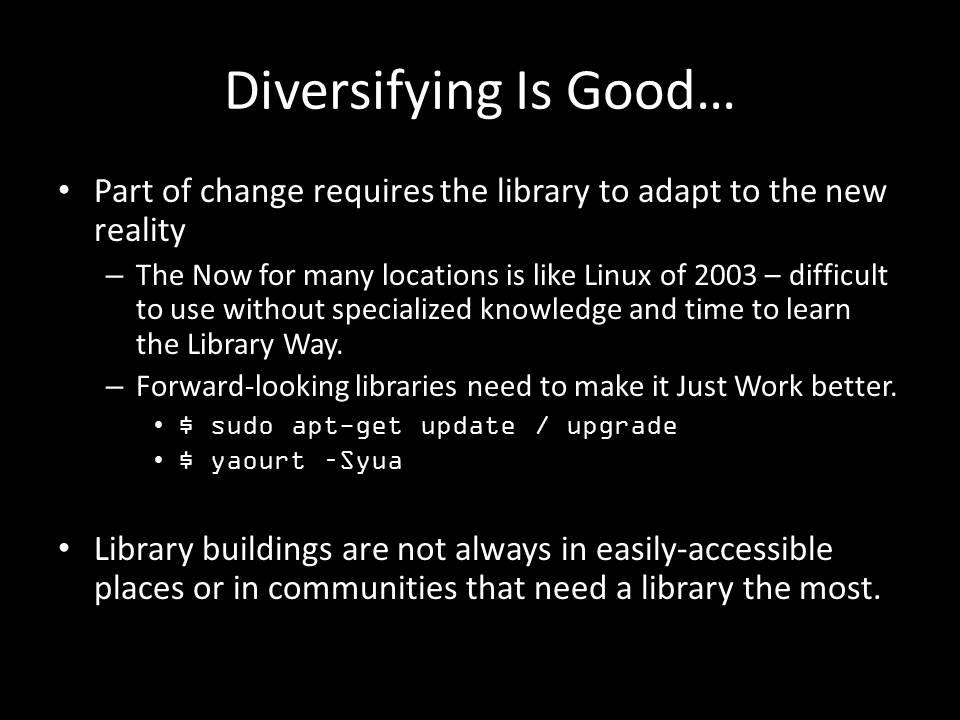So, public libraries are going to have to change. Big whoop. What good is a public library, anyway, if all these alternate content delivery systems exist and can do things better than libraries?

Free as in beer
Well, the first line of defense a public library puts up as to why you should care about them is that their services and materials require no up-front cost to use. The cost is paid through taxes, but truthfully, property tax levies for libraries are approximately the cost of one or two utterly foul coffee drinks at your local overpriced and overrated store per month when a library is at the ceiling of their taxing ability. For people who are new to the community, recently unemployed (or the long-term unemployed of the Great Recession after the housing crash of 2007), and those who, say, child labor laws prevent from making money to buy their own things, having a community resource without up-front cost is important in being able to participate in the digital and physical community, research ideas, solve problems, and acclimate to their new environment, among other things. Free space, free Internet access, free resources, free use of really expensive technologies. Free is good.
More often than not, the public library is used for civic groups, game-players, political organizations, municipal meetings, and many other organizations that need space to house all of their members and that provide some amenities for presentation or for meetings. We're usually the only game in town that does it for free, so long as you adhere to a couple of rules about who can attend (usually, everyone), and what you can charge for your event (sometimes, cost of materials, otherwise, nothing). More often than not, we're fighting with everyone else for our meeting room space to do programming in, because our meeting room space options are just that good.
The public library is rapidly becoming, if we're not already there, the last institution that's accessible by everyone that doesn't have a rent, cover, or other up-front charge just for access. If the public library dies, a large part of your institutions and groups die, too.
BUT…
Price is only a partial defense. The open-source community knows this. "Why would you pay money for corporate drek when a perfectly good free alternative is available?" If that free alternative doesn't work, isn't designed with a good UI, requires a significant amount of training before being able to use well, or otherwise isn't able to hit that sweet spot of Superior (Or At Least Good Enough) and Just Works, an open-source alternative often fails out, even if it's a well-marketed one.

Free as in freedom
The other major line of defense a public library can put up is that they're interested in keeping others away from your data, whether corporate or govermnental, if they keep that data in the first place. Additionally, public libraries, usually as a matter of policy, have a strong commitment to having diverse materials for access and in making sure that everyone, regardless of their identity, ability, or status, can use the materials, programs, and things that are available in the public library. Many public libraries don't keep histories of things library cards have checked out in the past, restrict the types of materials that can be checked out, or monitor internet usage by people to see which sites are being visited.
Libraries of all sorts profess that they will fight censorship whenever it appears, and when it comes from an outside entity looking to restrict books from the collection or seeking records that it really has no business collecting, public libraries and librarians are usually pretty good about fighting off that particular spectre.
Perhaps most prosaically, though, a large part of our computer users enjoy Facebook, Twitter, Google applications, and, in their daily browsing habits, probably provide more information to data-miners, ad companies, corporate entities, and government spies than they might realize. Public libraries aren't always at the vanguard of informing people about how much data is collected about them and in deploying their systems in a maximally-private and secure, yet still functional, manner. There are tools available, but public librarians don't always know about them, nor do they always have the technical knowledge needed to deploy them effectively. Most of our computers are running Microsoft Windows, with Internet Explorer as the default browser. As the PRISM and other NSA revelations pointed out, that's the equivalent of claiming you have a state of the art security system to fight off intruders, but you leave all the doors and windows of your house not only unlocked, but wide open. It is very difficult to protest those things that you cannot see and that do not leave traces of their activity behind.
The world of "private" is rapidly shrinking down, and public libraries are trying to maintain themselves as a place where "private" truly is, as best they know how. Regardless of what you may believe about the successes of these endeavours, that public libraries are trying makes them a valuable ally.
These are not easy concepts to necessarily pull into an elevator speech. Plus, they're arguments for why a public library doesn't need to change. But just sitting in the pocket of "free" isn't going to be enough. Change is a necessary component to relevance, and modernizing and diversifying what goes under the library umbrella is an excellent way to start.
Diversification is good...

As an example, I tried to use Linux in 2003, back when Mandrake, which became Mandriva, before Mandriva died and forked out to Mageia was the hot distribution for usage, competing with Red Hat Linux, which had a desktop version at the time. (The desktop Red Hat would merge with another project to become Fedora.) In this 2003 world, simple things like playing sounds and movies required a lot of console typing, scouring for libraries, solutions, and configuration files just to get ALSA (the Advanced Linux Sound Archietecture) set up correctly and able to play common media formats. On this attempt, I could not accomplish what I considered basic tasks on a Linux system, and trying made me think of all the tricks I had to play with MS-DOS to get around the memory requirements and play later-generation graphical adventure games. It was not a fun situation.
Fast forward just four years to 2007, or so, where, as a graduate student in library science, I decided to give Linux another go, as a dual-boot setup on a new computer that a friend had bought me, tired of how much I was complaining about how Windows was sucking resources on the old one. The hot distribution was Ubuntu at the time, in both its GNOME and KDE versions. After installing my preferred flavor, there were clear directions on how to install any non-free codecs (those that would require a license fee to be paid to use) from the repositories, assuming you had the proper licenses to do so (or were willing to take the risk of being sued by those companies for installing those codecs). There was a suite of default software installed that handled most basic tasks a user would expect their desktop computer to do, and if I wanted to update the system to the newest available software, it took two commands:
sudo apt-get updatesudo apt-get upgrade
Additionally, Ubuntu made it a promise to include major software updates every six months, on schedule, alleviating the need to hunt down and find the latest versions of programs to update them. As a system, Ubuntu was At Least Good Enough as Windows, and it Just Worked. The threshold had been crossed.
Jumping ahead again to today, with more Linux experience, as well as having shifted through Linux Mint to Arch Linux and now I only need one command to update my system, any time that I would like to do so:
yaourt -Syua
That's more like it. Ease of use, of updating, and enough software to do the functions that I'm going to need, and some functions that I might discover I need later on. That's what makes Linux a contender now for the desktop and mobile environments. There's still some work to be done on making those update commands more human-friendly, less cryptic, and in developing excellent GUI interfaces for the update commands, but that we can get it down to one command to make the system seamlessly update itself is a good thing.
How this extended metaphor applies to public libraries is that many public libraries are now operating more like Mandrake than Mint or Arch. If you have the patience, the time, the ability to come to the public library's buildings, and are willing to learn the library way and vocabulary, you too can accomplish great things with your public library's resources. Outside the public library, though, the world is moving on and building, compiling, and releasing newer tools that make the processes that public libraries are supposed to be very good at much much easier to use, using resources and fees and other things from outside the public library. If we want to insist on certain things, we need to do it in a way that's at least explainable (a la The Arch Way, even though The Arch Way itself may not be the best way of articulating good public library principles and ideas) and that will constantly re-evaluate its decisions to see whether or not the way that's been decided on is really still the best way.